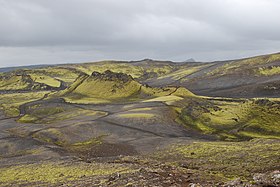Mist Hardships
| Laki | |
|---|---|
 |
|
| Highest point | |
| Elevation | Varies: canyon to 1,725 metres (5,659 ft) |
| Coordinates | 64°03′53″N 18°13′34″W / 64.06472°N 18.22611°WCoordinates: 64°03′53″N 18°13′34″W / 64.06472°N 18.22611°W |
| Geography | |
|
|
|
| Geology | |
| Mountain type | Fissure vents |
| Last eruption | 1784 |
Laki or Lakagígar (Craters of Laki) is a volcanic fissure in the south of Iceland, not far from the canyon of Eldgjá and the small village of Kirkjubæjarklaustur. Lakagígar is the correct name, as Laki mountain itself did not erupt, as fissures opened up on each side of it. Lakagígar is part of a volcanic system centered on the volcano Grímsvötn and including the volcano Thordarhyrna. It lies between the glaciers of Mýrdalsjökull and Vatnajökull, in an area of fissures that run in a southwest to northeast direction.
The system erupted violently over an eight-month period between June 1783 and February 1784 from the Laki fissure and the adjoining volcano Grímsvötn, pouring out an estimated 42 billion tons 14 km3 (3.4 cu mi) of basalt lava and clouds of poisonous hydrofluoric acid and sulfur dioxide compounds that contaminated the soil, leading to the death of over 50% of Iceland's livestock population, and the destruction of the vast majority of all crops. This led to a famine which then killed approximately 25% of the island's human population. The lava flows also destroyed 20 villages
The Laki eruption and its aftermath caused a drop in global temperatures, as 120 million tons of sulfur dioxide was spewed into the Northern Hemisphere. This caused crop failures in Europe and may have caused droughts in North Africa and India.
On 8 June 1783, a 25 km (15.5 mi) long fissure with 130 craters opened with phreatomagmatic explosions because of the groundwater interacting with the rising basalt magma. Over a few days the eruptions became less explosive, Strombolian, and later Hawaiian in character, with high rates of lava effusion. This event is rated as 6 on the Volcanic Explosivity Index, but the eight-month emission of sulfuric aerosols resulted in one of the most important climatic and socially repercussive events of the last millennium.
...
Wikipedia

